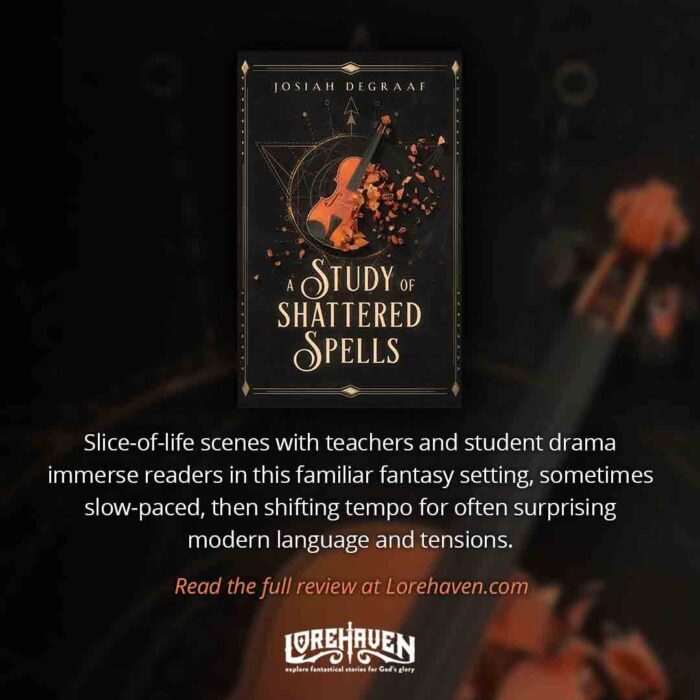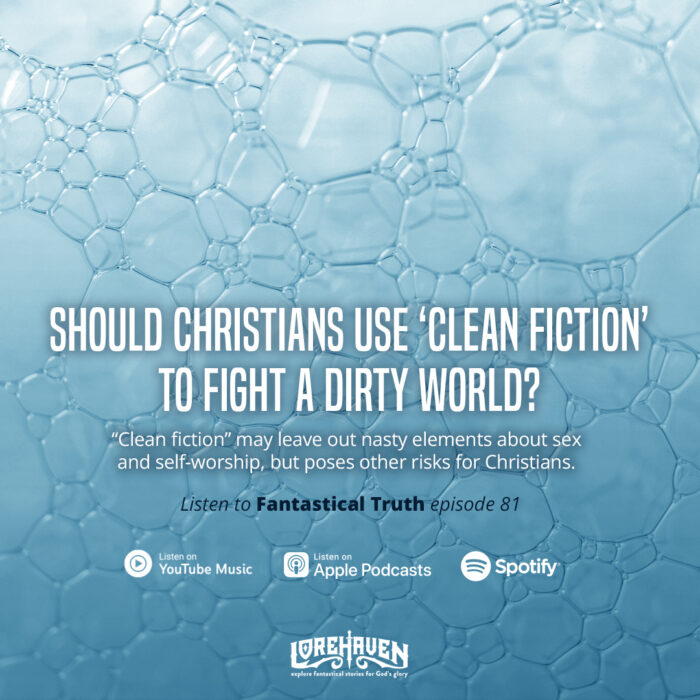81. Should Christians Use ‘Clean Fiction’ to Fight a Dirty World?
Podcast: Play in new window | Download (Duration: 1:17:23 — 72.2MB) | Embed
You musn’t go outside. If the plague doesn’t get you, the toxic culture will. Let’s be serious: worldview sewage pours out from your TV screen, and new generations of parents (not just grumpy Christians!) are waking up to nasty notions about sex and self-worship in the kids’ stories. That’s dirty stuff infesting our world. Do we need “clean reads” to keep out the filthy fiction?
Concession stand
- We’ll not be legalistic against “clean fiction.”
- We’ll not be legalistic in favor of “clean fiction.”
- “Don’t be legalistic” is not our standard. “Glorify God” should be.
- People have deeply personal preferences, associating them with stories.
- Stories help heal people in different ways. That factors into our exploration.
Episode sponsors
- Shawn Smucker’s The Weight of Memory
- Novel Marketing podcast
- See all sponsors
1. What we mean by saying “clean” fiction
- It usually means “does not include” XYZ (sex, violence, cussing, occult)
- “Clean” stories are often described as “wholesome” or “family friendly.”
- Their fans aren’t limited to older people and/or evangelical Christians.
2. How we benefit from reading “clean fiction”
- Clean fiction fans can sincerely desire to pursue holiness.
- These stories help reinforce morality for impressionable children.
- They can be especially healing in times of stress or suffering.
- Even secular readers enjoy simple, winsome, wholesome story-worlds.
- These stories reflect wholesome reality in a way “darker” stories cannot.
You will notice that we have got them completely fogged about the meaning of the word “real”. They tell each other, of some great spiritual experience, “All that really happened was that you heard some music in a lighted building”; here “Real” means the bare physical facts, separated from the other elements in the experience they actually had.
—The Screwtape Letters, C. S. Lewis
3. What we lose by reading only “clean fiction”
- They might reinforce the notion that sin (or morality) comes from stories.
- Or they connote the idea that only good feelings and safe spaces can heal us.
- They imply the gospel (or shallow versions) only works in pre-cleaned worlds.
- In excess, they can lead us away from God’s reality and prep for suffering.
Conclusion: let’s enjoy “clean fiction” for God’s glory, and in moderation.
- After all, too much of any comfort food leads to an imbalanced diet.
- No, we don’t want to be “wrecked”! Yet neither should we be coddled.
- No, Stories Should Not ‘Wreck You, The Reader’, Marian Jacobs
- Yes, Stories Should Help Heal You, The Reader, Marian Jacobs
- Saving Your Child From the Village, Rod Dreher at The American Conservative
- Why Amish Romance Novels Are So Popular
Com station
David Alan Mock wrote in reply to our response to him in episode 77:
I found the article on The Gospel Coalition you recommended about J. Mark Bertrand. It’s called “Christian Artists Tell the Truth About the World.” It’s from Sept. 2013, by Phil Wade. Thank you for sending me to it! [Text slightly edited.]
Autumn Grayson replied to episode 78, with Kara Swanson about Peter Pan:
When I was in first grade, I used to be obsessed with the Peter Pan story. Mainly the Broadway play I saw on tv. I never read the book, but a few aspects of the Peter Pan story spoke to me, especially since it interfaced with the way I was contemplating the notion of death at the time. I was a Christian even then, but the physical aspect of death still scared me.
Since Peter Pan never grew old, he would be able to live forever so long as he didn’t get killed by Captain Hook or something. So he had risk and hardship and adventure, but still that chance to live on and on in a place that was important to him. There were elements of that that I wanted and wished for, even if I could never have them to that extent(at least on earth). So Peter Pan brought some of these things out of me where I could notice and work through them. I’m at a different stage now, when it comes to thinking about death, and Peter Pan is no longer my favorite story. But it was an important step along my path and an important part in my development.
Kind of glad to hear the original Peter Pan book was darker and different than the movies, so I might have to read it (and Kara Swanson’s Dust) some time in the future.
Next on Fantastical Truth
Should Christians celebrate Halloween? What if we call it a “harvest festival”? We’ve all heard the jokes, but whether we engage or escape the thing, we must take seriously how our neighbors perceive the occasion. Right down to our lawn decor, Halloween’s trappings can encourage us to celebrate good things like fall and fandom—yet can also provoke us into flippant mockery of death and disease, and even the hope of resurrection. And that’s truly horrible. So yes, we’ll dress up and distribute candy, and hurl light against this darkness.


































Re: harvest festivals
I think it’s pretty ridiculous to call pseudo-Halloween parties “harvest festivals” because it’s nowhere near harvest during October, especially in the South. Wheat harvest takes place in May-ish in Texas, June-ish in Oklahoma. Milo/sorghum is generally done by August-September, which as you may notice is not the end of October. Even up here in the Frigid Wastelands of the North, they seem done with the corn harvest before the end of September. #agriculturalpedant
I think there’s an etymological argument for “carnival,” but maybe some high-church pedants would get on your case because Carnival is before Lent.
Thoughts about fiction that “wrecks” you: Isn’t that what Burnett’s experience with Saving Private Ryan was? Most of the time, I see that phrase used in the context of movies like Grave of the Fireflies or the first ten minutes of Up.
Thoughts for Spook-tober:
How about the idea of “memento mori”? It’s a little-g gothic favorite, but it did have roots in the Catholic church — especially in context to the Black Death, which could be considered topical again for some reason :/
I’m probably not gonna be good for any scary stories about Teh Gays, because the story of How I Worked With Two Gays at the Craft Store is a very boring one.
On the flip side, if you wanna to do some deconstruction on the concept of sexual or gender identity, deal me in. But I will also do some light deconstruction on the concept of identity on top of the whole sex-and-gender thing. (Pre-game hint: I would also bring up the concepts of sumptuary laws and social constructs.)
I’ve never seen Saving Private Ryan. You must mean the other guy.
Whoops. And I thought I was getting good at telling your voices apart.
” Allowed to enjoy ” am I allowed to live?